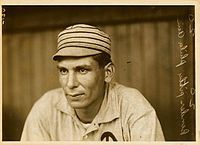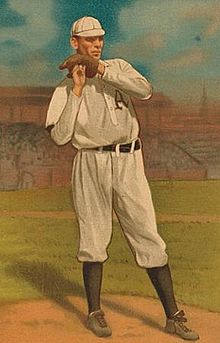- Chief Bender
-
For the former Cincinnati Reds player and front office man, see Sheldon "Chief" Bender.
Chief Bender 
Chief Bender, 1911Pitcher Born: May 5, 1884
Crow Wing County, MinnesotaDied: May 22, 1954 (aged 70)
Philadelphia, PennsylvaniaBatted: Right Threw: Right MLB debut April 20, 1903 for the Philadelphia Athletics Last MLB appearance July 21, 1925 for the Chicago White Sox Career statistics Win-Loss record 212-127 Earned run average 2.46 Strikeouts 1,711 Teams - Philadelphia Athletics (1903-1914)
- Baltimore Terrapins (1915)
- Philadelphia Phillies (1916-1917)
- Chicago White Sox (1925)
Career highlights and awards - 3× league leader in winning percentage
- 2× 20-game winner
- Pitched no-hitter in 1910
- 3× World Series champion (1910, 1911, 1913)
- American League pennant winner (1914)
Member of the National 

 Baseball Hall of Fame
Baseball Hall of Fame 


Induction 1953 Election Method Veteran's Committee Charles Albert "Chief" Bender (May 5, 1884[1] – May 22, 1954) was a pitcher in Major League Baseball during the first two decades of the 20th century. He was elected to the Baseball Hall of Fame in 1953.
Contents
Early life
Bender was born in Crow Wing County, Minnesota as a member of the Ojibwa tribe - he faced discrimination throughout his career[citation needed] , not least of which was the stereotyped nickname ("Chief") by which he is almost exclusively known today.
Baseball career
 1903 E107 "Chief" Bender(Collection RC)
1903 E107 "Chief" Bender(Collection RC)
After graduating from Carlisle Indian Industrial School and attending Dickinson College, Bender went on to a stellar career as a starting pitcher from 1903 to 1917, primarily with Connie Mack's Philadelphia Athletics (though with stints at the end of his career with the Baltimore Terrapins of the short-lived Federal League, the Philadelphia Phillies, and the Chicago White Sox).
Over his career, his win-loss record was 212-127, for a .625 winning percentage (a category in which he led the American League in three seasons). His talent was even more noticeable in the high-pressure environment of the World Series; in five trips to the championship series, he managed six wins and a 2.44 ERA. In the 1911 Series, he pitched three complete games, which tied Christy Mathewson's record of three complete games in a World Series. He also threw a no-hitter in 1910.
Bender was well liked by his fellow players. Longtime roommate and fellow pitcher Rube Bressler called him "One of the kindest and finest men who ever lived."[citation needed] Ty Cobb called him the most intelligent pitcher he ever faced.[citation needed] Bender was also known as one of the best sign-stealers of his time; Mack often put this skill to use by occasionally using him as the third-base coach on days he wasn't scheduled to pitch.[citation needed]
When the upstart Federal League offered him a significant increase in salary, Mack knew he couldn't hope to match it and released him. However, Bender went 4-16 for the Terrapins, and later regretted leaving Philadelphia.
After two years with the Phillies, he left baseball in 1918 to work in the shipyards during World War I. He came back to coach for the Chicago White Sox and even made a cameo appearance on the mound in 1925. But his heart remained tied to Philadelphia. Mack kept him on the Athletics' payroll as a scout, minor league manager, or coach from 1926 until Mack retired at the end of the 1950 season.
Bender was voted into the Hall of Fame in 1953, less than one year before his death. In 1981, Lawrence Ritter and Donald Honig included him in their book The 100 Greatest Baseball Players of All Time.
The Slider
The innovator of the slider is debated, but some credit Bender as the first to use the slider, then called a "nickel change", in the 1910s.[2] Bender used his slider to help him achieve a no-hitter and win 212 games in his career.[3]
See also
- List of Major League Baseball leaders in career wins
- List of Major League Baseball saves champions
- MLB All-Time Hit Batsmen List
- List of Major League Baseball no-hitters
Notes
- ^ There is uncertainty about Bender's exact birthdate. He was voted the SABR "Centennial Celebrity" of 1983, as the best baseball player or figure born in 1883. However, the SABR Baseball Research Journal for 1983 acknowledges that there are discrepancies in records about Bender's birth year, ranging from 1883 to 1885. 1884 is the figure most often given.
- ^ "WISCONSIN Magazine of History",Wisconsin Historical Society Press, Spring 2004 issue. Accessed July 8, 2007.
- ^ "National Baseball Hall of Fame and Museum: Hall of Famer detail",National Baseball Hall of Fame. Accessed July 8, 2007.
References
- Kashatus, William C. (2006). Money pitcher: Chief Bender and the tragedy of Indian assimilation. Penn State Press. pp. 199. ISBN 9780271028620.
- Powers-Beck, Jeffrey P. (2004). The American Indian integration of baseball. University of Nebraska Press. pp. 269. ISBN 9780803237452.
- Swift, Tom (2008). Chief Bender's Burden: The Silent Struggle of a Baseball Star. University of Nebraska Press. pp. 339. ISBN 9780803243217.
External links
- Career statistics and player information from Baseball-Reference, or Fangraphs, or The Baseball Cube
- Chief Bender at the Baseball Hall of Fame
- The Deadball Era
- Chief Bender at Find a Grave
Preceded by
Addie JossNo-hitter pitcher
May 12, 1910Succeeded by
Smoky Joe WoodPhiladelphia Athletics 1910 World Series Champions Frank Baker | Jack Barry | Chief Bender | Eddie Collins | Jack Coombs | Harry Davis | Topsy Hartsel | Jack Lapp | Bris Lord | Danny Murphy | Amos Strunk | Ira Thomas
Manager Connie MackPhiladelphia Athletics 1911 World Series Champions Frank Baker | Jack Barry | Chief Bender | Eddie Collins | Jack Coombs | Harry Davis | Jack Lapp | Bris Lord | Stuffy McInnis | Danny Murphy | Rube Oldring | Eddie Plank | Amos Strunk | Ira Thomas
Manager Connie MackPhiladelphia Athletics 1913 World Series Champions Frank Baker | Jack Barry | Chief Bender | Joe Bush | Eddie Collins | Jack Lapp | Stuffy McInnis | Eddie Murphy | Rube Oldring | Eddie Plank | Wally Schang | Amos Strunk
Manager Connie MackBaseball Hall of Fame Class of 1953 BBWAA Vote Dizzy Dean (79.17%) • Al Simmons (75.38%)Veterans Committee Pitchers inducted into the National Baseball Hall of Fame Alexander • Bender • Blyleven • M. Brown • R. Brown • Bunning • Carlton • Chesbro • Clarkson • Cooper • Coveleski • Cummings • Day • Dean • Dihigo • Drysdale • Eckersley • Faber • Feller • Fingers • Ford • B. Foster • R. Foster • Galvin • Gibson • Gomez • Gossage • Grimes • Grove • Haines • Hoyt • Hubbell • Hunter • Jenkins • Johnson • Joss • Keefe • Koufax • Lemon • Lyons • Marichal • Marquard • Mathewson • McGinnity • Méndez • Newhouser • Nichols • Niekro • Paige • Palmer • Pennock • Perry • Plank • Radbourn • Rixey • Roberts • Rogan • Ruffing • Rusie • Ryan • Seaver • Smith • Spahn • Sutter • Sutton • Vance • Waddell • Walsh • Welch • Wilhelm • Williams • Willis • Wynn • YoungMembers of the Philadelphia Baseball Wall of Fame Inducted as
PhilliesRoberts • Ashburn • Klein • Alexander • Ennis • Bunning • Delahanty • Williams • Hamner • Owens • Carlton • Schmidt • Bowa • Short • Simmons • Allen • Jones • Thompson • Callison • Luzinski • McGraw • Cravath • Maddox • Taylor • Magee • Hamilton • Boone • Green • Vukovich • Samuel • Kalas • Daulton • Kruk
Inducted as
AthleticsCategories:- 1884 births
- 1954 deaths
- Baltimore Orioles (IL) players
- Baltimore Terrapins players
- Baseball players from Minnesota
- Carlisle Indian Industrial School alumni
- Chicago White Sox coaches
- Chicago White Sox players
- Dickinson College alumni
- Johnstown Johnnies players
- Major League Baseball pitchers
- Minor league baseball managers
- National Baseball Hall of Fame inductees
- Native American sportspeople
- New Haven Indians players
- New Haven Profs players
- New Haven Weissmen players
- Ojibwe people
- Philadelphia Athletics coaches
- Philadelphia Athletics players
- Philadelphia Phillies players
- Reading Aces players
- Richmond Colts players
Wikimedia Foundation. 2010.

